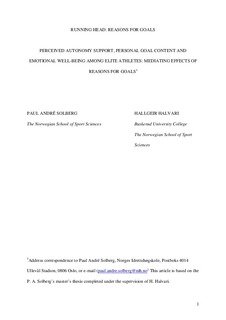| dc.contributor.author | Solberg, Paul André | |
| dc.contributor.author | Halvari, Hallgeir | |
| dc.date.accessioned | 2010-05-07T09:38:27Z | |
| dc.date.available | 2010-05-07T09:38:27Z | |
| dc.date.issued | 2009-06 | |
| dc.identifier | Seksjon for coaching og psykologi / Department of Coaching and Psychology | |
| dc.identifier.citation | Perceptual and Motor Skills. 2009, 108(3), 721-743 | en_US |
| dc.identifier.issn | 0031-5125 | |
| dc.identifier.uri | http://hdl.handle.net/11250/170615 | |
| dc.description | I Brage finner du siste tekst-versjon av artikkelen, og den kan inneholde ubetydelige forskjeller fra forlagets pdf-versjon. Forlagets pdf-versjon finner du på www.ammonsscientific.com: http://www.ammonsscientific.com/c.php?f=TTEzRkIwNzA5XzAwMDgxOQ== / In Brage you'll find the final text version of the article, and it may contain insignificant differences from the journal's pdf version. The original publication is available at www.ammonsscientific.com: http://www.ammonsscientific.com/c.php?f=TTEzRkIwNzA5XzAwMDgxOQ== | en_US |
| dc.description.abstract | Summary.—The relations between perceived support of autonomy from coaches, characteristics of personal goals, and emotional well-being from the perspective of self-determination theory was examined among 95 elite athletes (59% men; M = 21.6 yr., SD = 6.1) from Track and Field, Greco-Roman Wrestling, Taekwondo, and Power Lifting. Elite athletes were those representing their country in their sport. It was hypothesized that having autonomous reasons for goals would mediate the positive associations between perceived autonomy support and intrinsic goal content with subjective positive emotional well-being, and that controlled reasons for goals would mediate the association between extrinsic goal content and subjective negative emotional well-being. An idiographic approach to measures of personal goals and the autonomous and controlled reasons and intrinsic and extrinsic contents were performed. Perceived autonomy support from the coach was assessed with the Sport Climate Questionnaire and subjective emotional well-being was assessed with the Positive and Negative Affect Schedule. All hypotheses were supported by path analyses using LISREL. | en_US |
| dc.language.iso | eng | en_US |
| dc.publisher | Ammons Scientific | en_US |
| dc.subject | well-being | en_US |
| dc.subject | elite athletes | en_US |
| dc.subject | psychology | en_US |
| dc.subject | reasoning | en_US |
| dc.subject | autonomy | en_US |
| dc.title | Perceived autonomy support, personal goal content, and emotional well-being among elite athletes : mediating effect of autonomous reasons for goals | en_US |
| dc.type | Journal article | en_US |
| dc.type | Peer reviewed | en_US |
| dc.subject.nsi | VDP::Social science: 200::Psychology: 260 | en_US |
| dc.source.pagenumber | 721-743 | |
